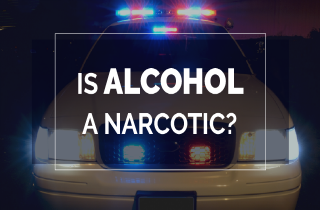It depends.
There are divided opinions and views on this topic. According to the traditional medication definition of “narcotics”, alcohol may be considered as narcotic, because drinking alcohol does cause sleepiness. Legally, however, there is not an official classification of alcohol under the term of narcotic by a governmental institutions or scientist experts.
Continue reading here to learn more about the classification of alcohol as a psychoactive drug. After reading this article, if you still have questions, we encourage you to post all your questions or comments below. We’ll make sure to respond to you personally and promptly.
What is a narcotic?
The origin of the word “narcotic” is Greek and means “sleep”. According to its ethymological origin, narcotics are considered drugs that initiate sleep. Alcohol, iself, causes people to be less awake and less active, and it causes people to feel sleepy and dizzy.
Other substances that fall into the cathegory of narcotics include opiates and opioid pain relievers. Narcotics work by binding to receptors in the brain and blocking the sensation of pain. They are used only for pain that is severe and cannot be managed or lessened by other types of painkillers. When used carefully and under a healthcare provider’s direct care, these drugs can be effective at reducing pain.
Is alcohol a legal narcotic: Schedule I, II, III, or IV drug?
No, alcohol is not a controlled substance by federal law.
Thus, it’s not a part of any of the scheduling protocol enforced by the Drug Enforcement Agency (DEA). However, it is a part of a regulation called Controlled Substances/Alcohol BASIC. The Controlled Substances/Alcohol Behavior Analysis and Safety Improvement Category (BASIC) is one of seven categories that the Federal Motor Carrier Safety Administration (FMCSA) uses to determine how a motor carrier ranks relative to other carriers with a similar number of safety events. This regulation deals with the operation of commercial motor vehicles (CMVs) by drivers who are impaired due to alcohol, illegal drugs, and the misuse of prescription or over-the-counter medications.
Is alcohol addictive?
Yes, alcohol is addictive.
Drinking acohol can cause changes in the body and brain, and long-term alcohol abuse can have devastating effects on your health and life. How do you know if you are addicted? Bascially, if you recognize any pattern of drinking that causes harm and damage to the person who drinks…alcohol addiction is possble. Here is a list of situations which can indicate alcohol addiction when a person drinks alcohol over a longer period of time:
- Problems with work or skipping child care and family responsibilities because of drinking.
- Drinking in dangerous situations, such as before or while driving.
- Being arrested for driving under the influence of alcohol (DUI) or for hurting someone while drunk.
- Avoiding family conflicts and relationship problems with the help of alcohol.
The typical characteristics of alcoholism include craving, which is a strong need for drinking alcohol; and loss of control over drinking, which means you have lost the ability to stop drinking. Another sign of alcoholism is tolerance. It’s explained as the need to increase the amount of alcohol in order to get the “high” effect.
Dependence on alcohol signals you that your body has gotten accustomed to the presence of alcohol and you experience withdrawal symptoms when you stop drinking suddenly. You probably are addicted to alcohol if you recognize the following symptoms when you stop drinking alcohol after a period of heavy drinking:
- anxiety
- nausea
- shakiness
- sweating
You should know that alcoholism is considered as a disease. It can become chronic and life-threatening if it is not treated.
When has drinking become a problems?
Some experts say that in small quantities alcohol is considered as stimulant, but in large doses is considered as depressant. Medically, alcohol is a central nervous system (CNS) depressant that is rapidly absorbed from the stomach and small intestine into the bloodstream.
Due to its psychoactive properties, alcohol is vastly abused. The National Institute on Alcohol Abuse and Alcoholism reported that in 2013 about 16 million adults aged 18 and older were diagnosed with an Alcohol Use Dissorder (AUD). The Dietary Guidelines for Americans has established the quantity for moderate drinking and that is up to 1 drink per day for women (~7 drinks per week) and up to 2 drinks per day for men (~14 drinks per week). So, if you’re drinking more than this, seek help.
According to the National Institute on Drug Abuse (NIDA), alcoholism or alcohol dependence is a diagnosable disease characterized by a strong craving for alcohol, and/or continued use despite harm or personal injury. Alcohol abuse, which can lead to alcoholism, is a pattern of drinking that leads to harm on one’s health, interpersonal relationships, or ability to work.
Let’s verify your coverage for treatment at an American Addiction Centers location. Your information is always confidential.
Is alcohol a narcotic questions
Did we answer your question about the classification of alcohol? If you still feel that you want to ask additional questions or simply want to give your feedback on this subject, feel free to post in the section below. Will make sure to provide a personal and prompt response to all legitimate inquiries.









Related Posts